#rimini meeting
Photo
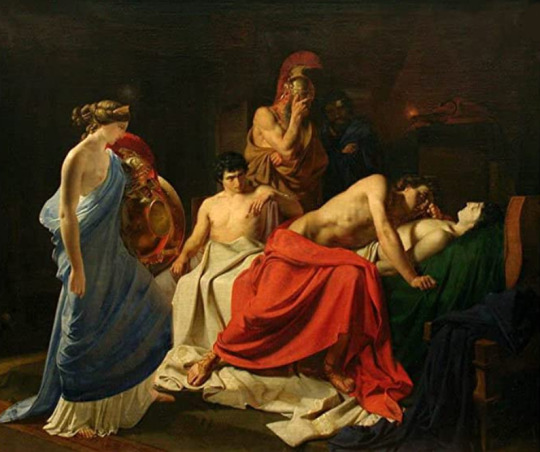

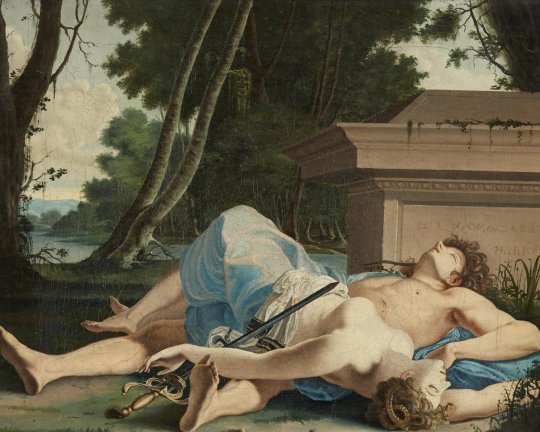
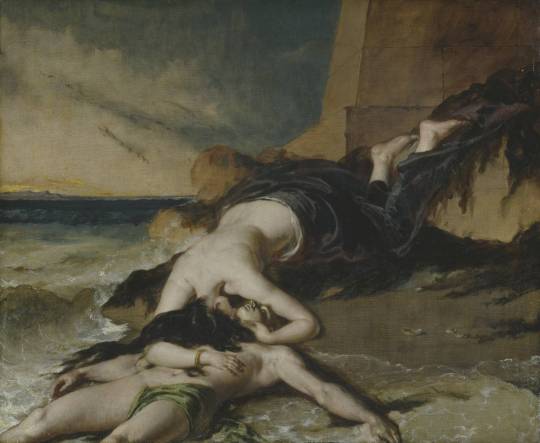


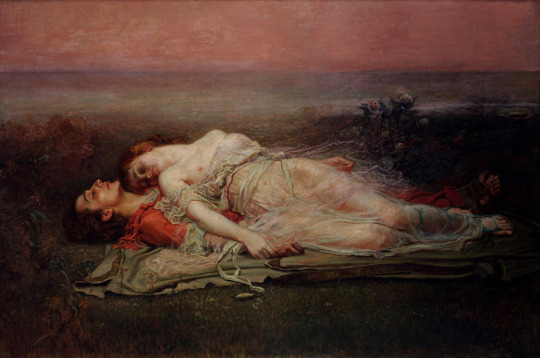

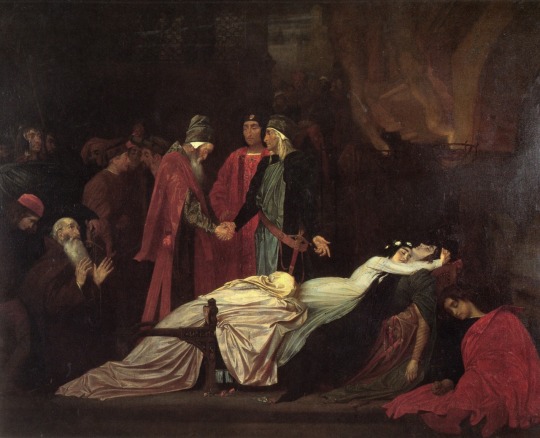

Achilles and the body of Patroclus (1885) by Nikolai Ge
Apollo and Hyachintus (1769) by Nicolas-René Jollain
The Suicides of Pyramus and Thisbe by Guido Reni
Hero and Leander (1828) by William Etty
Orpheus and Euridice by (1872) George Frederic Watts
Cefalo and Procris (1879) by Marques de Oliveira
Tristán and Isolda (1910) Rogelio de Egusquiza
Dante and Virgil Meeting the Shades of Francesca da Rimini and Paolo (1851) by Ary Scheffer
The Reconciliation of the Montagues and Capulets over the Dead Bodies of Romeo and Juliet (1855) by Frederick Leighton
The Burial of Atala (1808) by Anne-Louis Girodet de Roussey-Trioson
#romeo and juliet#the reconciliation of the montagues and capulets over the dead bodies of romeo and juliet#frederick leighton#dante and virgil meeting the shades of francesca da rimini and paolo#ary scheffer#dante#dante alighieri#william shakespeare#the burial of atala#anne-louis girodet de roussy-trioson#apollo#achilles and the body of patroclus#nikolai ge#apollo and hyacinthus#hero and leander#william etty#collect them all!#atala#i probably got some of the years wrong
236 notes
·
View notes
Text
Se riportassi fedelmente il mio flusso di coscienza a proposito del meeting di Comunione e Liberazione, riceverei la tessera onoraria di qualche movimento situazionista satanista.
[L'Ideota]
16 notes
·
View notes
Text
Applaudono tutti e di tutto
Applaudono tutti e di tutto
Si vede che al Meeting di Rimini i partecipanti di ieri erano diversi da quelli del giorno precedente. Grande ovazione , infatti, per il Presidente del Consiglio, Mario Draghi. Pari pari uguale a quella tributata 24 ore prima a Giorgia Meloni. Se non c’è stato il cambio di pubblico, invece, si potrebbe pensare ad un caso di schizofrenia collettiva. Eh sì, tertium non datur.
Gli applausometri…

View On WordPress
0 notes
Text
Draghi al meeting di Rimini: "L'Italia è grande, ma non da sola"
Lunghi applausi per il presidente del Consiglio italiano uscente
0 notes
Photo

Un appuntamento che da alcuni anni mi accompagna nel mese di agosto. Mostre, incontri e confronti con amici di Fidenza di Parma e non solo. Una grande occasione per scoprire nuove esperienze per le comunità che amministriamo. Nella diversità, per il bene comune. Incontro tra i leader politici nazionali presso #meetingrimini2022 #rimini #meeting (presso Meeting Rimini) https://www.instagram.com/p/ChmXqDItJMa/?igshid=NGJjMDIxMWI=
0 notes
Text

Dante and Virgil Meeting The Shades of Francesca Da Rimini and Paolo, 1851
Ary Scheffer
#Ary Scheffer#19th century#white#art#painting#art history#fashion#portrait#dutch art#romanticism#dante alighieri#literature#the divine comedy#1850s
648 notes
·
View notes
Link
A Gallarate dal 7 al 15 maggio nella chiesa di San Pietro sarà aperta al pubblico la Mostra San Francesco e il Sultano #mostrasanfrancescoeilsultano #Gallarate #CentroCulturaleTommasoMoro #Meetthemeeting #meetingdiRimini
#mostra san francesco e il sultano#Gallarate#Centro Culturale Tommaso Moro#Meet the meeting#meeting di rimini
0 notes
Note
hey, can you do a circles of hell post like the heaven one?
The Nine Circles of Hell 😈🔥
Dante Alighieri’s The Divine Comedy is divided into 3 parts: Inferno, Purgatorio and Paradiso. The Inferno presents us with the popular concept of Nine Circles of Hell.
Ante-Inferno
Think of this as the Ground Lobby for Hell.
The Gates of Hell have this inscription: "Lasciate ogne speranza, voi ch’intrate" (Abadon all hope, ye who enter here)
Souls who couldn't choose between good and evil reside here, tortued and chased by hornets and snakes. (Seems like indecision is also a sin, haha)
There are angels here as well who chose to be on the side of neither good and evil, and they're also tormented.
After crossing the river on the boundary for hell with Charon, you meet the first level of hell:
First Circle: Limbo
The first circle is home to the unbaptized and virtuous pagans, who simply didn't know that Christ exist.
These souls have lived morally, but failed to accept Christiantiy as a religion
No physical torture, but waves of sadness flow through the souls, lamenting the fact that they're close to Heaven but aren't in it.
Retirement community of the afterlife: Hippocrates, Aristotle, Virgil, Homer, Horace, Ovid, Socrates, Plato, Saladin
Second Circle: Lust
The wind-buffeted second circle of Hell is the final destination of the lustful and adulterous.
Souls are blown about in a violent storm, without hope of rest. They are torn in a raging storm and thrown against rocks.
Cleopatra and Helen of Troy were among its most famous residents. Francesca da Rimini and her lover Paolo.
Third Circle: Gluttony
Those who overindulge themselves are forced to lie in vile, freezing slush, guarded by Ceberus
Unable to move, they lay on the ground forever while being hurled with sweage and dirt.
Ciacco of Florence is here.
Fourth Circle: Avarice & Prodigality
This section of Hell is reserved for the money-grubbers and overly materialistic among us. Those who hoarded money come here.
The greedy battle each other, forever rolling giant boulders on each other. When they push the heavy weights, it rolls back and the process starts all over again.
Plutus guards them.
Fifth Circle: Wrath & Sulllenness
Dante tells us that the wrathful and angry souls of this circle spend eternity waging battle with each other on the banks of River of Styx.
The sullen are forced to breath below the dark waters, chocking on the black mud derived from the world above.
Fillippo Argenti is here.
───〃★ Door to Lower Hell: gate guarded by fallen angels ★〃───
Sixth Circle: Heresy
Heretics spend eternity entombed in flaming crypts in the sixth circle. Think of a graveyard with burning tombstones.
Heresy is the sin of having beliefs opposed to the Christian belief, which can be a little vague in modern times.
Florentines Farinata degil Uberti and Cavalcante de' Cavalvanti are here.
Seventh Circle: Violence
The Seventh Circle is sub-categorized into 3 smaller rings: Oter, Middle and Inner.
The outer ring is filled with blood and fire and reserved for murderers and thugs. Centaurs guard the Outer Ring, shooting criminals with arrows.
The middle ring is where, according to Dante, suicide victims go. They’re transformed into trees and fed upon by harpies.
The inner ring, a place of burning sand, is reserved for those who are violent against God and nature (blasphemers)
Eighth Circle: Fraud
Geryon, a creature symbolizing fraud, welcomes you to the eighth circle. He has a human face, a scorpion tail and giant wings.
The eighth circle is subdivided into ten trenches, where you’ll find con artists of all sorts. These trenches are called Malebolge (Evil pockets) and each contains different types of criminals who commited fraud.
Panderes and seducers, flatterers, sorcerers, false prophets, liars, thieves, people who created false money, counterfeits, impersonators, schismatics, etc. reside here.
Ninth Circle: Treachery
The final circle is a frozen wasteland occupied by history’s greatest traitors. Betrayers of are frozen in a lake of ice, and most of Satan's body is also immersed in ice.
It is divided into 4 stages: (1) Caina - traitors to family (2) Antenora - traitors to nation or politicians (3) Ptolomaea - hosts to betray theiur guests (4) Judecca - those to betray their lords/masters.
In the very center, Satan punishes the greatest betrayers of all time: Judas Iscariot, who betrayed Christ, and Brutus and Cassius who betrayed Julius Caesar.
Satan has three mouths, each of which eats a specific person: with left and right devouring Brutus and Cassius and the centre mouth devouring Judas.
If you like my blog, buy me a coffee☕ and find me on instagram! 📸
#writers and poets#writing#creative writing#writers on tumblr#creative writers#helping writers#let's write#poets and writers#writeblr#resources for writers#hell#dante#inferno#writers block#writers#writerscommunity#write#writer#writing advice#writing prompt#how to write#write every day#write anything#write up#write it#write that down#writing inspiration#writing community#writing tips#on writing
61 notes
·
View notes
Text
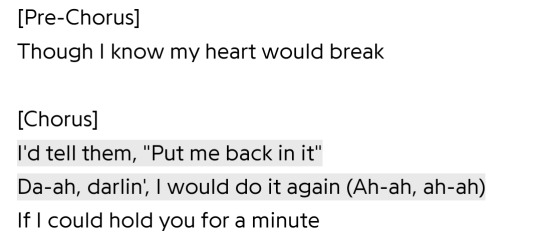
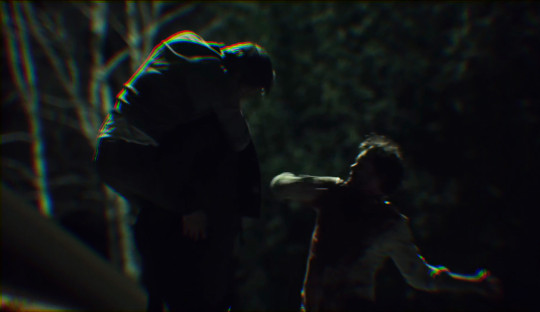




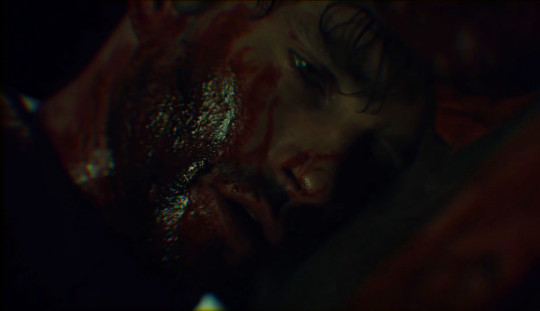
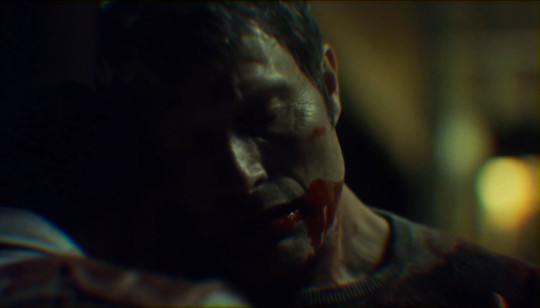
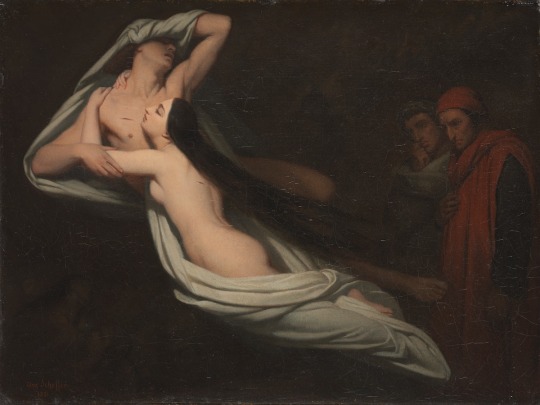

Francesca, Hozier // Hannibal, NBC (The Wrath of the Lamb, 3x13) // Inferno, Canto V. Dante Alighieri // Dante and Virgil Meeting the Shades of Francesca da Rimini and Paolo, Ary Scheffer (1851)
#hannigram#will graham#hannibal lecter#mads mikkelsen#hugh dancy#nbc hannibal#murder husbands#script#The Wrath of the Lamb#hozier#dante's inferno
223 notes
·
View notes
Text
a very long post about hozier - unreal earth
Index:
Lyrical allusions
Visual imagery
Reading list
Interviews
Reviews
Lyrical allusions
The lyrics on Unreal Unearth are informed by texts such as Irish writer Flann O’Brien’s philosophical 1967 novel, The Third Policeman, Dante's Inferno, and Jonathon Swift.
De Selby (Part 1)
At last, when all of the world is asleep
You take in the blackness of air
The likes of a darkness so deep
That God at the start couldn’t bear
"Human existence being an hallucination containing in itself the secondary hallucinations of day and night (the latter an insanitary condition of the atmosphere due to accretions of black air) it ill becomes any man of sense to be concerned at the illusory approach of the supreme hallucination known as death." The Third Policeman - Flann O'Brien
Bhfuilis soranna sorcha
Ach tagais 'nós na hoíche
Trína chéile; le chéile
Bhfuilis soranna sorcha
Claochlaithe is claochlú an ealaín
Is ealaín dubh í
Bhfuilis soranna sorcha
Ach tagais 'nós na hoíche
Trína chéilе; le chéile
Bhfuilis soranna sorcha
Claochlaithe is claochlú an еalaín
Is ealaín dubh í
Although your bright and light […]
You arrived to me like nightfall, you come like nightfall
You and I sort of mixed together
You and I metamorphosized
So that same idea of you can’t see where one begins and where one ends that, that is some kind of metamorphosis of some kind
“a body with another body inside it in turn, thousands of such bodies within each other like the skins of an onion, receding to some unimaginable ultimum”
De Selby (Part 2)
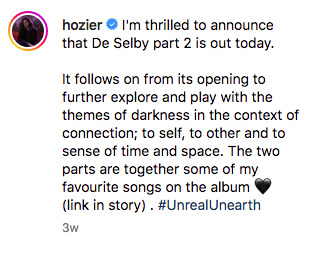
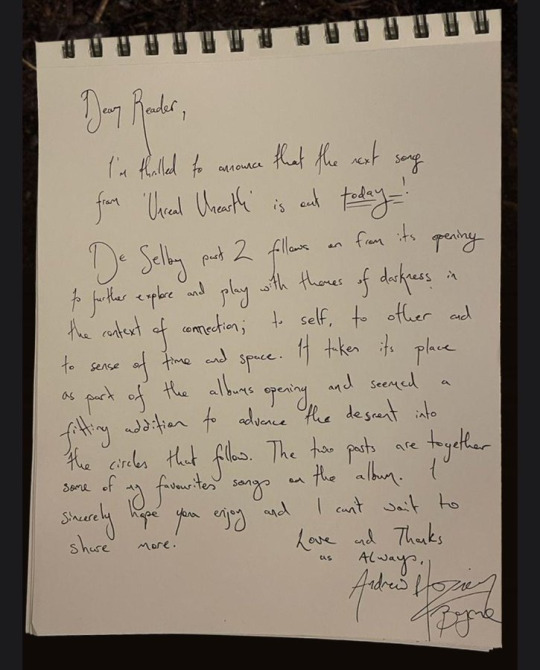
What you're given, what you live in
Darlin', it finds a way to live in you
"The gross and net result of it is that people who spent most of their natural lives riding iron bicycles over the rocky roadsteads of this parish get their personalities mixed up with the personalities of their bicycle as a result of the interchanging of the atoms of each of them and you would be surprised at the number of people in these parts who are nearly half people and half bicycles"
First Time
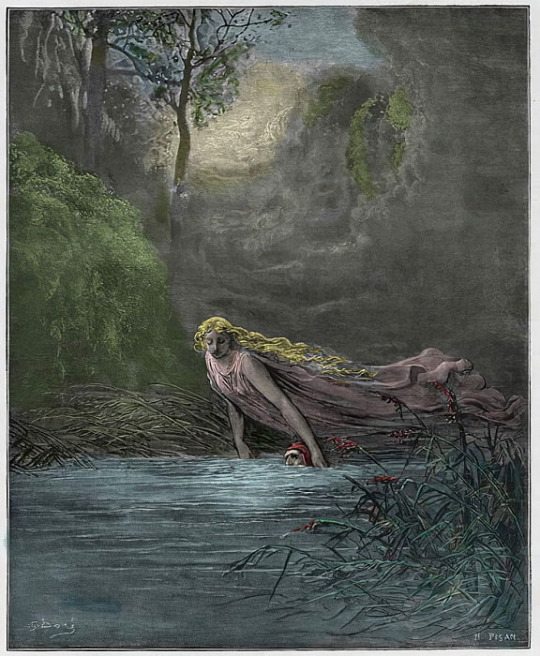
Remember once I told you about
How before I heard it from your mouth
My name would always hit my ears as such an awful sound
First Time refers to Beatrice Smiles: Canto XXXI - Dante's meeting with Beatrice after being left by Virgil, where she rebukes him for his sins. Dante does not remember his name but recognises Beatrice. He was dunked into the River of Forgetting by Matelda
“Respond, you of poor memory, confess.
_Lethe awaits. Your thoughts are undeterred.”
These days I think I owe my life
To flowers that were left here by my mother
Ain't that like them, giftin' life to you again
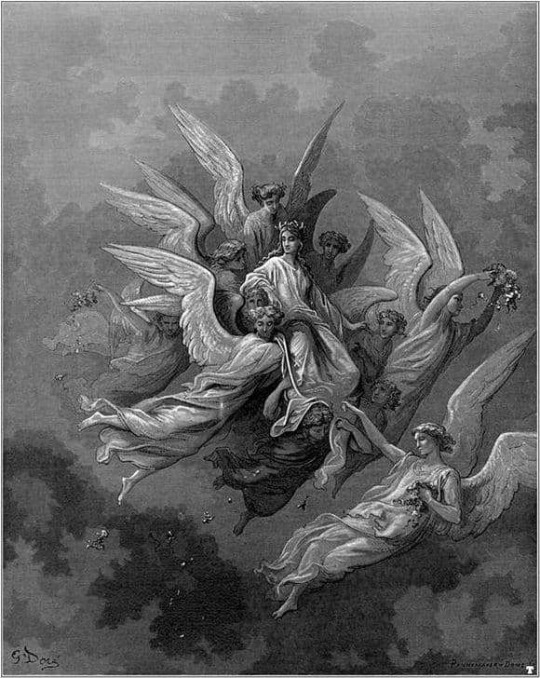
Francesca
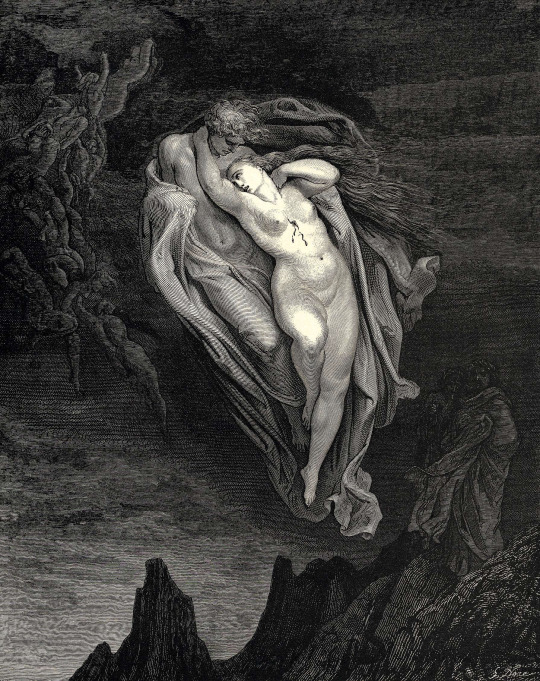
In Dante's Inferno, the character of Beatrice embodies love inspired by God - she is a religious object that should inspire faith, devotion, and salvation. By contrast, the character of Francesca da Rimini is encountered in the Terrace of Lust. She was a medieval noblewoman who was killed by her husband, Giovanni Malatesta upon discovering an affair between her and Paolo Malatesta (his brother). She represents love that leads one's soul to destruction.
I would not change it each time
Heaven is not fit to house a love like you and I
I would not change it each time
"Love led us to one death, conjointly felled.
__For him who slew us, Cäina waits below."
I Carrion (Icarian)
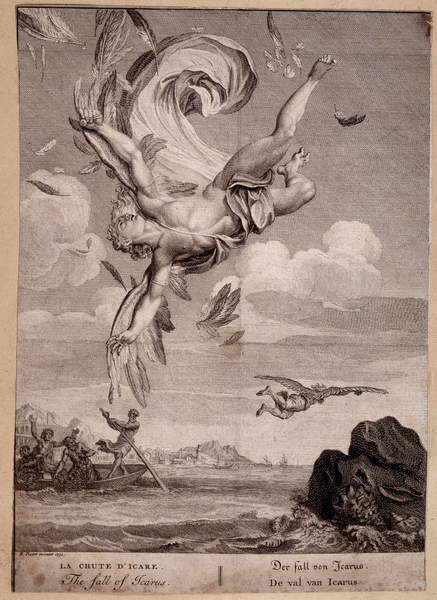
One deep breath out from the sky
I've reached a rarer height now that I can confirm
All our weight is just a burden offered to us by the world
This song has a connection with Inferno 17. Phaeton, Icarus, Daedalus and Arachne: are symbolic of Ulysses, the embodiment of transgression in Dante’s personal mythography. Icarus is a figure of fear for because he was equipped by his father to alter the boundaries of man's physical nature. It is the sin of pride that leads one to folly.
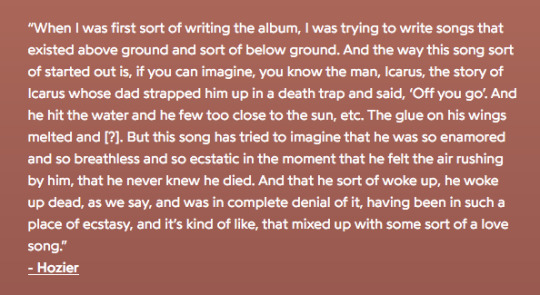
Eat Your Young
“Eat Your Young”, a contemporary riff on the Irish writer Jonathan Swift’s 1729 satirical essay “A Modest Proposal” that suggests Irish people eat their children to alleviate their hunger and poverty.
Come and get some
Skinnin' the children for a war drum
Puttin' food on the table sellin' bombs and guns
It's quicker and easier to eat your young
The first verse also contains allusions to Canto 6 of Inferno - this level is related to "gluttony" but it's used by Dante to discuss the political landscape and moral failures of the City of Florence. Gluttony, in this case, is defined as excessive desire for dominion and power. So Hozier comments on inequality and poverty with a distinctly political air.
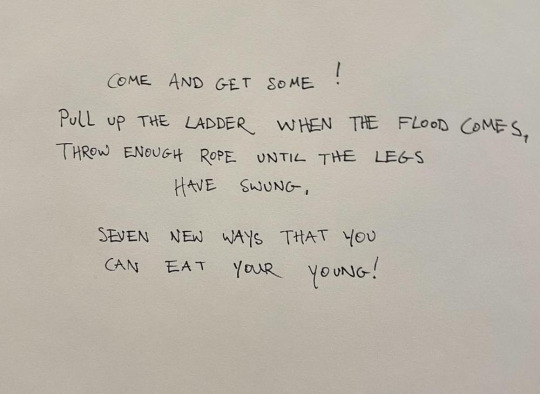
Damage Gets Done
Here Hozier refers to Canto 7 of Inferno and the concept of misura - a lack of moderation or self-control
And darlin', I haven't felt it since then
I don't know how the feelin' ended
But I know being reckless and young
Is not how the damage gets done
In this Canto, Dante is discussing wealth management - hoarding and wasteful spending. While avarice is a traditionally Christian sin, Dante inserts the sin of prodigality by himself. This tells us that Dante's moral standard is not essentially Christian. Hozier also plays with the intentions of the texts he refers to and inserts his own takes on philosophy and biography. Very Dantean, if you ask me.
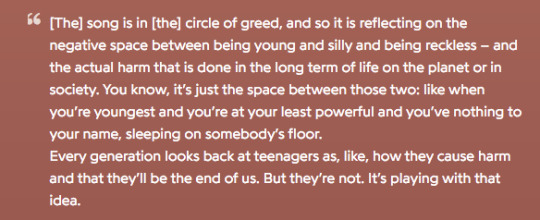
Who We Are
I think this is a narrative shift similar to Canto 8-9 where the fallibility of Virgil is explored and the tension between faith and fear.
You only feel it when it's lost
Gettin' through still has a cost
Quietly, it slips through your fingers, love
Falling from you drop by drop
What I had left here I just held it tight
So someone with your eyes might come in time
To hold me like water
Or Christ, hold me like a knife

Son of Nyx
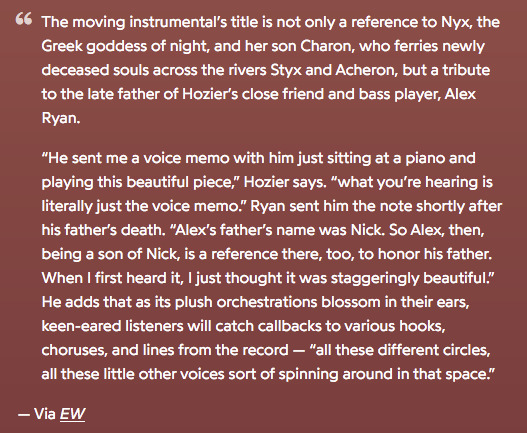
All Things End
The mystery at the heart of Inferno 10, the mystery that generates its enormous poetic power, is the connection of love to sin.
All Things End is superficially about the end of a relationship but it's also about heresy. The specific heresy in the canto is Epicureanism: materialism that suggests the soul dies with the body. It is a denial of the idea of an immortal soul and a "wilful separation of the soul from God". The Epicureans in Canto 10 are represented as eternally trapped in the temporary and ephemeral materialistic reality of the present. They are denied what is eternal and transcendent (ie divine)
And all things end
All that we intend is scrawled in sand
And slips right through our hands
And just knowing
That everything will end
Should not change our plans
When wе begin again
To Someone From A Warm Climate (Uiscefhuarithe)
‘Uiscefhuarithe’, as described by Hozier, is an irish word for ‘something that has been made cold by water’.

Butchered Tongue
The Genius annotation gives a lot of detail here: In “Butchered Tongue”, Hozier tackles the 7th Circle of Hell Canto XII to XVII, known as the ‘Circle of Violence or Hell of the Violent and Bestial’ which is one of the lower circles of Hell and is divided into three distinct rings, each punishing different types of violence. The track focuses mainly on the first ring called the ‘Outer Ring’ where those who commit violence against others and their property are punished by being submerged in a river of boiling blood called the Phlegethôn, and centaurs patrol the area, shooting arrows at those who emerge from the blood.

The song has a number of allusions to the horrors of colonial violence.
Anything But
I think this song refers to Canto 26 which establishes the critical metaphor that equates desire with flying. Here Dante encounters Ulysses - the embodiment of the epic wandering hero.
"But here one must fly, I mean with the swift wings and the pinions of great desire."
Canto 26 is critical of imperial ambitions and expansionism as Dante casts the city of Florence as a giant bird of prey whose wings beat over land and sea. This is thought as representing a specter of tyranny.
Dante presents Ulysses as the ultimate flawed hero that embodies the expression of desire as flight. Hozier expresses his desire for flight and wandering in Anything But.
I wanna be the shadow when my bright future's behind me
I wanna be the last thing anybody ever sees
I hear he touches your hand, and then you fly away together
If I had his job, you would live forever
Abstract (Psychopomp)
Here Hozier references a childhood trauma of witnessing an animal being hit by a car and Canto 28. It's somewhat alike to the canto in a metatextual sense because it presents a gruesome picture. In Inferno 28 souls are mutilated by devils. The language is pretty clinical and graphic, like the song.
"Who, even with untrammeled words and many
attempts at telling, ever could recount
in full the blood and wounds that I now saw?."
The poor thing in the road, its eye still glistening
The cold wet of your nose, the earth from a distance
Unknown / Nth
This one has a lot of references that have been discussed by Hozier for its allusions to the ninth circle of Hell and Cantos 34. The ninth circle is sometimes referred to as treachery but the sin is fraud.
betrayal is fraud committed against those who trust us
Hozier said he conceived of Satan/the Devil as the first prisoner of hell. I've got to link the Digital Dante article about this Canto because it's very relevant:
You know the distance never made a difference to me
I swam a lake of fire, I'd have walked across the floor of any sea
Ignored the vastness between all that can be seen
And all that we believe
So I thought you were like an angel to me
First Light
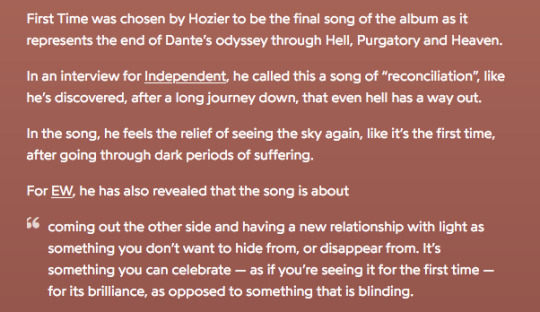
One bright morning changes all things
Soft and easy as your breathing, you wake
Your eyes open at first a thousand miles away
But turning shoot a silver bullet point-blank range
And I can scarce believe what I'm believing in
Could this be how every day begins?
"Whichever day it was, it was a gentle day – mild, magical and innocent with great sailings of white cloud serene and impregnable in the high sky, moving along like kingly swans on quiet water. The sun was in the neighbourhood also, distributing his enchantment unobtrusively, colouring the sides of things that were unalive and livening the hearts of living things" - The Third Policeman
Visual imagery
"Down into the earth where dead men go I would go soon and maybe come out of it again in some healthy way, free and innocent of all human perplexity." - The Third Policeman

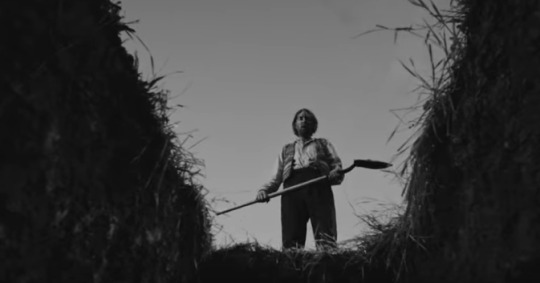
"Not everyone know how I killed old Phillip Mathers, smashing his jaw in with my spade." - The Third Policeman - Flann O'Brien
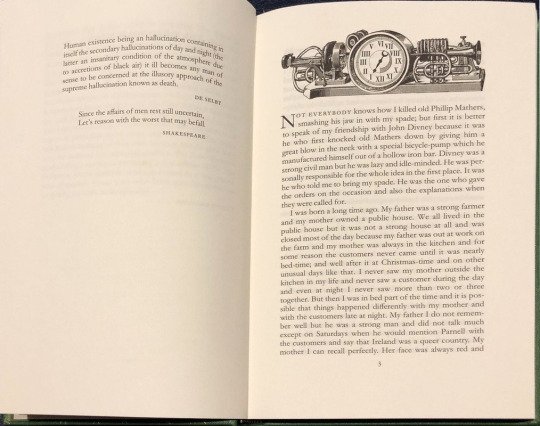
“If a man stands before a mirror and sees in it his reflection, what he sees is not a true reproduction of himself but a picture of himself when he was a younger man”
Reading list
“Eat Your Young”, a contemporary riff on the Irish writer Jonathan Swift’s 1729 essay “A Modest Proposal”
The Third Policeman by Flann O’Brien: an expert investigation
Bestselling author Michael Foley celebrates a comic, Kafkaesque masterpiece and explores what makes it great. But why was it cannibalised
The Irish Times
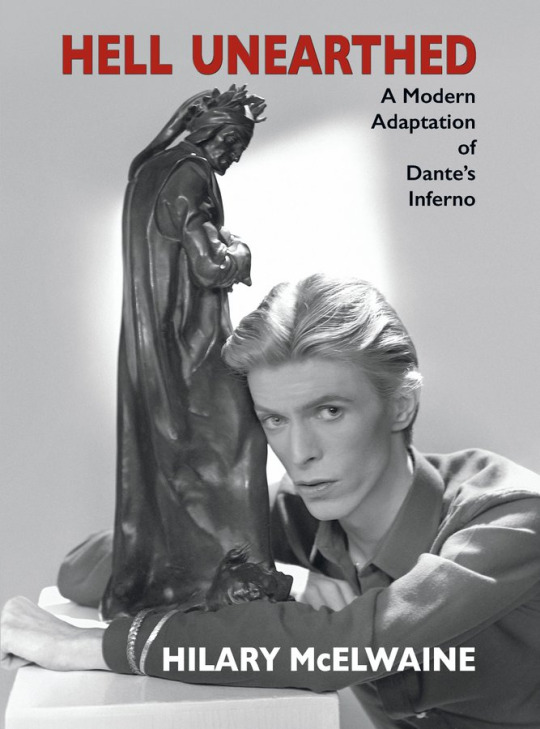
The Icarian Community Nauvoo | Paul M. Angle
Re-admitted to France, Cabet made plans to move his ideal society from the printed page to reality. In December 1847, he announced that Ic
fee.org|Paul M. Angle
An overview of the 1798 Irish rebellion
Interviews
“We betray ourselves in the act of opening up to somebody and believing so much,” Hozier says, passing a hand across his face. He looks weary, all of a sudden, voice cracking a little. “Our eyes betray us, our hearts betray us, our minds betray us. And that’s the ‘Nth’ reference: we open ourselves up to something, only to betray ourselves…”
Hell, at Least According to Hozier, Never Sounded Sweeter
On the eve of his return to the spotlight, the Irish crooner mulls over Ovid, 'Inferno,' and his status as the internet’s forest king.
Vanity Fair|Condé Nast
Hozier: ‘I think everyone goes through their version of hell’
The Irish artist is releasing his long-awaited third record ‘Unreal Unearth’, which was inspired by Dante’s Inferno. He speaks to Roisin O’C
The Independent
“There’s a subtle element and I wanted to be light and playful with it. The album can be taken as a collection of songs, but also as a little bit of a journey. It starts with a descent and I’ve arranged the songs according to their themes into nine circles, just playfully reflecting Dante’s nine circles and then an ascent at the end”
the album reflects upon two of the nine circles of hell: gluttony and heresy.
“There’s some moments that are a bit more old school and stuff that’s Nineties grunge sounding too. For other moments we were leaning into playing with a lot of synthesisers. But we’ve arranged the album into circles and the EP just represents two of those – those soul moments within it.” - Rolling Stone Interview
Divine Comedy explainers
Dante's 9 Circles of Hell: A Guide to the Structure of 'Inferno'
Here's a structural overview for the nine circles of hell in Book 1 (Inferno) of Dante Alighier's Divine Comedy.
ThoughtCo
Full Glossary for The Divine Comedy: Inferno
Absalom Bible. David's favorite son; killed after rebelling against his father: 2 Samuel 18.Acheron the River of Sorrow.Achilles Greek Mytho
cliffsnotes.com
Dante Alighieri: Mythology in the Divine Comedy
Mythology in the Divine Comedy Throughout Dante’s work “The Divine Comedy”, the author uses Greek and Roman mythology to elevate and to pro
ITAL3550SLU - Medieval & Renaissance Italian Literature
Reviews
Hozier - 'Unreal Unearth' review: Epic, expansive and ethereal
On his third album, the Irish sing-songwriter utilizes simplicity and space while venturing into new sonic territory — Read the NME review
NME|Aliya Chaudhry
Hozier: Unreal Unearth album review — solitude, spirituality and a touch of Dante | Financial Times
The singer’s roar is as impressive as ever but he also deploys other vocal styles to fine effect in his third album
ft.com
On Unreal Unearth, Hozier Makes His Boldest Work Yet
On Unreal Unearth, Hozier works through biblical source material and Dante's Inferno to make sense of isolation and human sorrow.
Paste Magazine
Hozier – ‘Unreal Unearth’ album review: A beautiful, angst-filled journey through the nine circles of hell
'Unreal Unearth' dives into the concept of Dante's Inferno.
Far Out Magazine
Unreal Unearth review | Hozier merges pop with profound prose
From the haunting echoes of Irish folklore to the pulsating beats of indie pop, this is Hozier at his artistic peak. Read our Unreal Unearth
whynow
Album: Hozier - Unreal, Unearth
Only a few artists can be said to have exploded on to the scene like Hozier. The solo, Irish musician – full name Andrew John Hozier-Byrne –
theartsdesk.com
115 notes
·
View notes
Text
Hozier’s ‘Francesca’ is from the PoV of Francesca da Rimini
Hozier has spoken about how ‘Unreal, Unearth,’ is going to be a homage to Dante’s Inferno (the first part of Dante’s poem, the Divine Comedy), and in the song ‘Francesca,’ Hozier takes us through the second circle of hell (Lust).
When Dante first enters the circle, he describes it as:
“So bears the tyrannous gust those evil souls. On this side and on that, above, below, It drives them: hope of rest to solace them.”
This imagery of strong, unrelenting wind is mirrored in the first verse of Francesca,
“My life was a storm since I was born
How could I fear any hurricane?”
In this verse, the speaker seems unrepentant and views the punishment as something they endure because,
“Now that it’s done.”
And they are damned for eternity,
“There’s not one thing that I would change.”
While in the circle of lust, Dante meets a woman called Francesca Da Rimini (see the end of this post for a brief overview of her life). Interestingly when Dante is exiled from Florence, he stays with Francesca’s nephew, Guido Novello da Polenta and some of Francesca’s lines in the Inferno also appear in Guido’s love sonnets.
At this point, it is essential to note that Dante was theologically/philosophically influenced by St Thomas Aquinas, who viewed adultery as intrinsically sinful (‘secundum see). And when Dante speaks to Francesca about her ‘sins,’ she does not call it adultery but instead talks of love and says:
“Love, that excuses no one loved from loving.”
Thus Francesca paints her love for Paolo as something beyond her control and greater than herself. And the motif of the sinners being tossed in the wind as their divine punishment links with this idea; the damned have no control over their bodies, which is an inversion of their sins on earth.
Hozier captures this helplessness in the face of love in the following lyric:
“A grip takin’ hold like a cancer that grows
Each piece of your body that it takes.”
However, Dante is not without sympathy for Francesca, and when he hears her story he,
“I, through compassion fainting, seem’d not far
From death, and like a corpse fell to the ground.”
Yet as the writer of the poem (and therefore the true God of the Inferno), he chooses to damn her. And this judgment rests on the Christian idea that the only irresistible form of love should be love for the creator and not for another human being.
Hozier appears to disagree with Dante’s conclusion by stating:
“Heaven is not fit to house a love like you and I.”
From Wikipedia: Francesca da Rimini[a] or Francesca da Polenta[a] (died between 1283 and 1286)[1] was a medieval noblewoman of Ravenna who was murdered by her husband, Giovanni Malatesta, upon his discovery of her affair with his brother, Paolo Malatesta.
156 notes
·
View notes
Note
Hi! Might I suggest a song? Francesca by Hozier gives me HUGE Elriel vibes :)
I heard it’s about a couple from Dante’s inferno that were condemned for being affair partners. However, hozier doesn’t vilify them but instead makes their love seem so strong and the speaker has no regrets. It reminds me a of Elriel because, while I don’t believe they are having an affair in any way, it represents acting outside of the path that was set for you. A love so strong you damn the consequences to be together.
Just some thoughts :)
Thank you for your suggestion!
I love Hozier and Dante’s Inferno (i’m so very italian in this Moment 😂) was one of my favorite works to study 🥹
This song was in my list already especially for The tragic and forbidden 😏 story of Paolo and Francesca
Yes it involves adultery BUT it was inevitabile for how their story began. I will put a small summary I found because I’m still not very Good with written English 😅
Francesca was the daughter of the lord of Ravenna, a city-state at war with Rimini, a rival power in northern Italy. To secure peace, Francesca’s father entered into an alliance with Rimini’s leaders, agreeing to marry his daughter to their heir apparent, Giovanni, who has been variously described as uncouth and deformed or crippled. The Francesca’s father was perceptive enough to realise that his romantic young daughter would not welcome such a man as her husband, so the handsome Paolo was invited to stand proxy for his brother at the wedding. Unfortunately, it would appear that no one told Francesca that Paolo was only the proxy. Francesca had fallen instantly in love with the dashing Paolo and must have thought herself the luckiest girl in the world, so we can only imagine her feelings of horror when she discovered the truth. Paolo and Francesca began an affair and when Giovanni discovered them, he killed them both in a rage.
So yes it has some very Elriel vibes (minus The tragic end I Hope!) I’ll leave a little of their quote from Dante’s Inferno its too beautiful 🥹
Love, that can quickly seize the gentle heart,
took hold of him because of the fair body
taken from me—how that was done still wounds me.
Love, that releases no beloved from loving,
took hold of me so strongly through his beauty
that, as you see, it has not left me yet.
[…]
One day, to pass the time away, we read
of Lancelot—how love had overcome him.
We were alone, and we suspected nothing.
And time and time again that reading led
our eyes to meet, and made our faces pale,
and yet one point alone defeated us.
When we had read how the desired smile
was kissed by one who was so true a lover,
this one, who never shall be parted from me,
while all his body trembled, kissed my mouth.
A Gallehault indeed, that book and he
who wrote it, too; that day we read no more.”
Ah to read a scene like this in their book 😍 my heart would not Be able to handle it 🥹
13 notes
·
View notes
Text
Draghi ha riparlato a quelli che verranno - di Giancarlo Infante
Draghi ha riparlato a quelli che verranno – di Giancarlo Infante
Il “fantasma” di Draghi si è materializzato al Meeting di Rimini. Faccio riferimento al termine utilizzato con simpatia qualche giorno fa su Politica Insieme da Massimo Maniscalco (CLICCA QUI) che sa, benissimo, quanto si tratti di considerare come l’esperienza Draghi resterà con una grande forza condizionatrice per gran parte della prossima legislatura, se non per tutta.
Loro, quelli che lo…
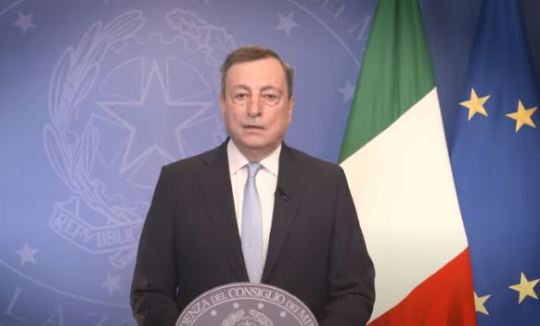
View On WordPress
0 notes
Text
Il ministro Gino
Attanagliato dal sospetto che gli preferissimo Nordio e Sangiuliano, il ministro Lollobrigida ce l’ha messa tutta per entrare nelle nostre grazie. E, dobbiamo riconoscerglielo, ci è riuscito. Le sue uscite su “sostituzione etnica” ed “etnia italiana”, che ne avevano fatto l’idolo del Ku Klux Klan e l’antesignano del generale Vannacci, non erano male. E neppure l’alibi di ferro sfoderato per discolparsene: “Sono ignorante, non razzista”, che poi è il motto dell’intero governo. Ma c’era sempre un che di fuori tema o di fuor d’opera, nelle sue esternazioni, essendo lui il ministro dell’Agricoltura e Sovranità Alimentare. Mancava una bella scempiaggine attinente alle deleghe spiritosamente assegnategli dalla premier-cognata. E ieri è arrivata nel luogo più consono: il Meeting di Rimini, dove l’uditorio applaudirebbe anche il gobbo del Quarticciolo, il Canaro della Magliana e la saponificatrice di Correggio. Lì, fra le standing ovation, Francesco Lollobrigida detto Gino ha testualmente espettorato: “L’ho detto spesso agli amici degli Stati Uniti, e lo condividono anche loro (lui infatti è solito rivolgersi direttamente alle nazioni, non si sa in quale lingua, e quelle gli rispondono, ndr): sono un grande popolo, ci hanno liberati, ci hanno difesi e lo fanno ancora; ma su una cosa non ci possono insegnare niente, a mangiare”. Già, perché in Italia “c’è una grande educazione alimentare, anche interclassista: infatti da noi spesso i poveri mangiano meglio dei ricchi perché cercando dal produttore l’acquisto a basso costo comprano qualità”. Basta andare nei negozi di prodotti naturali, biologici, chilometro zero per trovare file di mendicanti da far invidia alla Caritas e a Sant’Egidio. I ricchi invece sono tutti a sfondarsi nei McDonald’s, dai kebabbari e nei baracci più malfamati. Ecco perché il governo ha deciso di moltiplicare i poveri levando il reddito di cittadinanza, negando il salario minimo e lasciando impazzire i prezzi al carrello e alla pompa su pressione della potente lobby dei nullatenenti. Non per far la guerra ai poveri, ma per migliorare la qualità della loro alimentazione e consentire anche agli ex benestanti, finalmente piombati nella miseria, di assaporare le delizie della migliore cucina italiana. Ora, per dire, è allo studio un nuovo sms dell’Inps con le istruzioni per la tessera annonaria Dedicata a Te: “Se sei fortunato avrai 382,5 euro l’anno, ma potrai spenderli solo al banco del contadino e al negozio bio”. Novità anche in quello che leverà il Rdc ai pochi che ancora lo prendono: “Ora che sei diventato o tornato povero, sappi che lo facciamo per migliorare la tua dieta. A proposito: hai mai provato il digiuno intermittente? Mangi la prima settimana e salti le altre tre. È una figata, i ricchi se la sognano”.
Marco Travaglio
47 notes
·
View notes
Text
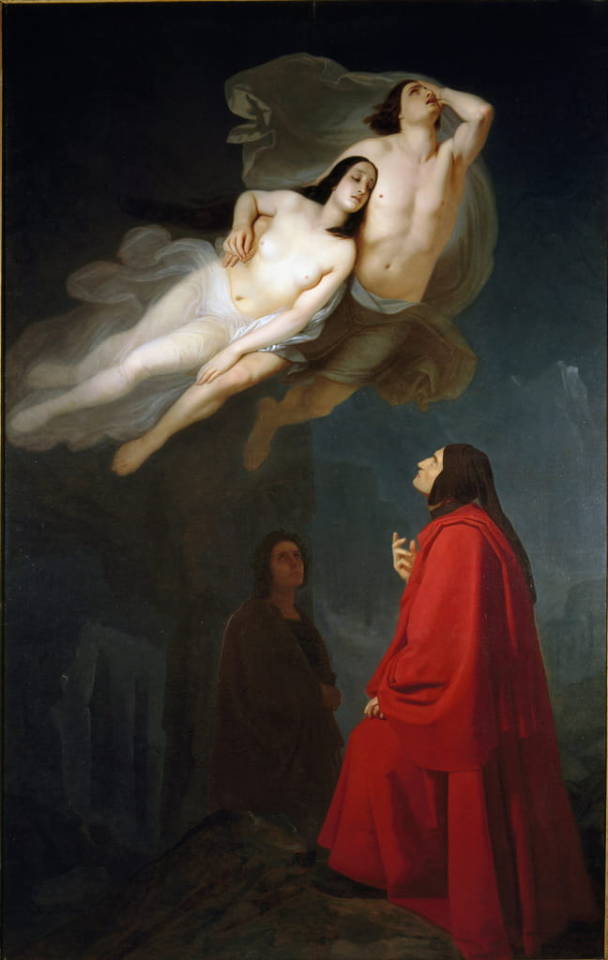
Maurizio Frascheri - Paolo and Francesca.
Dante and Virgil meet Francesca da Rimini and her brother-in-law Paolo Malatesta, guilty of adultery, in the circle of lust in the Underworld.
#Maurizio Frascheri#paolo and francesca#whirlwind of lovers#souls#dead#death#hell#divine comedy#dante and virgil
8 notes
·
View notes
Text
Beneath The Mask
The dialogue is sampled from the scene in "The Masque of the Red Death" (1964 film) when Prospero meets the Red Death in the Black Room.
Red Death: Prospero. You command me to wait? Very well. I wait.
Prospero: Condotti? Rimini? Who are you beneath your mask?
Red Death: Is my costume such a disguise that you don't recognize me?
Prospero: Your voice is familiar. Dr. Bernelli, that's who you are. Bernelli, you dog, thinking to… You are not Bernelli.
Red Death: No. The doctor dances in the white room. But I passed close by him. Truly, Prospero, you don't know me?
Prospero: So you've come.
Red Death: Yes, Prospero.
Prospero: [To Francesca] On your knees.
Francesca: Prospero!
Prospero: [To Francesca] On your knees. [To Red Death] The Prince of Darkness. I would like to see your face.
Red Death: There is no face of death until the moment of your own death. And I am only one of many messengers.
Prospero: Who do you come for?
Red Death: Many.
Prospero: All?
Red Death: Not all.
Prospero: I knew I was right. I knew it. I've won.
Red Death: The time of unmasking. They begin to show their naked faces.
3 notes
·
View notes